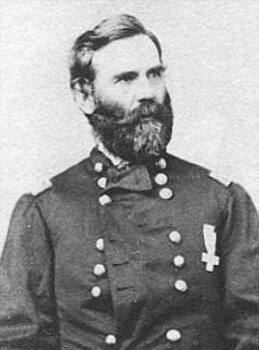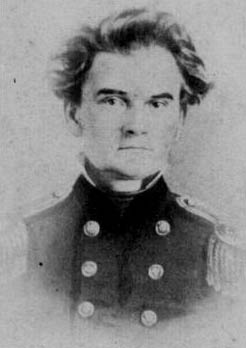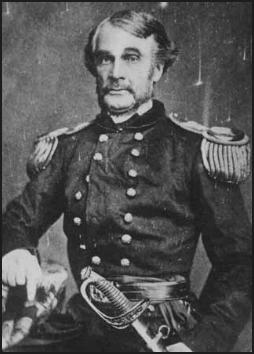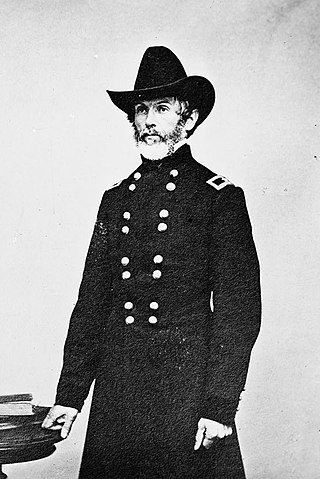Alexander Caldwell Jones was an American lawyer, journalist, diplomat, and Confederate States Army officer during the American Civil War.
Contents

Alexander Caldwell Jones was an American lawyer, journalist, diplomat, and Confederate States Army officer during the American Civil War.

He was born in 1830 near Moundsville, West Virginia, at that time a part of Virginia, to Garrison B. Jones and Martha Houston. [1] He enrolled at Virginia Military Institute on July 28, 1846, and was graduated on July 4, 1850. [1]
He then studied law and moved to Minnesota territory, where he became a district attorney and served as probate judge in St. Paul, Minnesota. In 1858-1860 he served as Minnesota's adjutant general. [1]
When his native state declared its secession from the United States in 1861 he returned to Virginia, where he joined the 44th Virginia Infantry. He was commissioned a lieutenant-colonel on May 1, 1862, and was wounded in the Battle of Gaines's Mill.
After convalescing from his injuries and serving in the Bureau of Conscription he resigned his commission on June 16, 1863, and requested a transfer to the Trans-Mississippi Dept. There he served on Gen. Magruder's staff and was then given the command of a Texas brigade of infantry. Gen. Kirby Smith recommended his promotion to brigadier-general on March 16, 1865, although there is no confirmation of his appointment. Jones was paroled in Brownsville, Texas on July 24, 1865, as a "brigadier-general". He was given a presidential pardon, dated August 15, 1865, sponsored by the Attorney General and the Hon. J. J. Jackson, which described him as a "rebel brigadier general". [2]
Jones left for Mexico to serve under Emperor Maximilian until the fall of his regime. He then returned to West Virginia, and lived in Wheeling with his wife Ella Clemens' family. He became the editor of the National Intelligencer, but that newspaper failed in 1869.
In 1880 he was appointed U.S. Consul in Nagasaki [3] and was transferred in 1886 to the China embassy in Chungking, where he died on Jan. 13, 1898. [4]

James Harrison Wilson was a United States Army topographic engineer and a Union Army Major General in the American Civil War. He served as an aide to Maj. Gen. George B. McClellan during the Maryland Campaign before joining Maj. Gen. Ulysses S. Grant's army in the Western Theater, where he was promoted to brigadier general. In 1864, he transferred from engineering to the cavalry, where he displayed notable leadership in many engagements of the Overland Campaign, though his attempt to destroy Lee’s supply lines failed when he was routed by a much smaller force of Confederate irregulars.

General Edmund Kirby Smith was a senior officer of the Confederate States Army who commanded the Trans-Mississippi Department from 1863 to 1865. Before the American Civil War, Smith served as an officer of the United States Army.

John Cleveland Robinson had a long and distinguished career in the United States Army, fighting in numerous wars and culminating his career as a Union Army brigadier general of volunteers and brevet major general of volunteers in the American Civil War. In 1866, President Andrew Johnson nominated and the U.S. Senate confirmed Robinson's appointment to the brevet grade of major general in the regular army. He was a recipient of the Medal of Honor for valor in action in 1864 near Spotsylvania Courthouse, Virginia, where he lost a leg. When he retired from the U.S. Army on May 6, 1869, he was placed on the retired list as a full rank major general, USA. After his army service, he was Lieutenant Governor of New York from 1873 to 1874 and served two terms as the president of the Grand Army of the Republic.

William Birney was an American professor, Union Army general during the American Civil War, attorney and author. An ardent abolitionist, he was noted for encouraging thousands of free black men to join the Union army.

William "Extra Billy" Smith was a lawyer, congressman, the 30th and 35th Governor of Virginia, and a major general in the Confederate States Army during the American Civil War. On his appointment in January 1863, at 65, Smith was the oldest Confederate general to hold field command in the war.

George Washington Getty was a career military officer in the United States Army, most noted for his role as a division commander in the Army of the Potomac during the final full year of the American Civil War.

Cadmus Marcellus Wilcox was a career United States Army officer who served in the Mexican–American War and also was a Confederate general during the American Civil War.

Seth Maxwell Barton was a United States Army officer and, then, a brigadier general in the Confederate States Army during the American Civil War. He later became noted as a chemist.

John McCausland, Jr. was a brigadier general in the Confederate army, famous for the ransom of Hagerstown, Maryland, and the razing of Chambersburg, Pennsylvania, during the American Civil War.

Brigadier-General Mosby Monroe Parsons was a senior officer of the Confederate States Army who commanded infantry in the Trans-Mississippi Theater of the American Civil War. Parsons was murdered by Captain Dario Garza, at the head of a body of Mexican soldiers, on or about August 15, 1865, near China, Nuevo León, Mexico.

Isaac Harding Duval was an adventurer and businessman prior to becoming a brigadier general in the Union Army during the American Civil War. He was a postbellum U.S. Representative from West Virginia in the 41st United States Congress.

Kenner Garrard was a brigadier general in the Union Army during the American Civil War. A member of one of Ohio's most prominent military families, he performed well at the Battle of Gettysburg, and then led a cavalry division in the army of Major General William T. Sherman during the Atlanta Campaign. He developed a reputation for personal bravery and was cited for gallantry at the Battle of Nashville as an infantry division commander.

John Pegram was a career soldier from Virginia who served as an officer in the United States Army and then as a brigadier general in the Confederate Army during the American Civil War. He became the first former U.S. Army officer to be captured in Confederate service in 1861 and was killed in action near the end of the war.
Jeremiah Cutler Sullivan was an Indiana lawyer, antebellum United States Navy officer, and a brigadier general in the Union Army during the American Civil War. He was among a handful of former Navy officers who later served as infantry generals during the war.

Edmund Brooke Alexander was an officer in the United States Army in the Mexican-American War through the American Civil War who rose to the rank of brevet Brigadier General in 1865.

John Sanford Mason was a career officer in the United States Army who served in the Indian Wars, Mexican-American War, and as a general in the Union Army during the American Civil War.

Sumner Carruth was an officer in the volunteer army of the United States during the American Civil War. He commanded the 35th Massachusetts Volunteer Infantry and eventually rose to the command of two different brigades in the IX Corps.

Joseph Bloomfield Leake was an attorney and an Iowa State Senator who entered the Union Army during the American Civil War. He became a Brevet Brigadier General before the war was over. After the war he became the U.S. District Attorney for the Northern District of Illinois in Chicago.
Joseph Nelson Garland Whistler was a career United States Army officer. He served in the Mexican–American War and received a brevet appointment for distinguished service in the Battle of Contreras and the Battle of Churubusco. At the beginning of the American Civil War, Whistler was among the U.S. Regular Army officers taken prisoner by Confederates in Texas in April 1861 and paroled but was not exchanged until August 15, 1862. In 1863, he became colonel of the 2nd New York Heavy Artillery Regiment. He received a promotion and four brevet appointments in the regular army for his service during the Overland Campaign, specifically the Battle of North Anna, and the Siege of Petersburg, specifically the Second Battle of Petersburg. He was nominated on January 13, 1866 and confirmed on March 12, 1866 for appointment to the grade of brevet brigadier general of volunteers, to rank from March 13, 1866. He retired in on October 19, 1886 as colonel of the 15th U.S. Infantry Regiment.

Henry Walton Wessells was an American brigadier general, best known for his service during the American Civil War, including his surrender of Union fortifications during the Battle of Plymouth in 1864.